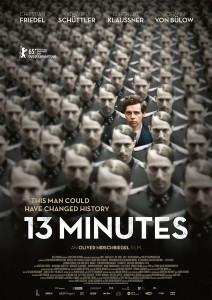13 Minutes (2015) Review
13 Minutes (2015)
Director: Oliver Hirschbiegel
Screenwriters: Leonie-Claire Breinersdorfer, Fred Breinersdorfer
Cast: Christian Friedel, Katharina Schüttler, Burghart Klaußner, Johann von Bülow, David Zimmerschied
13 Minutes is a WW2 biopic about Georg Elser, the German carpenter who tried to kill Adolf Hitler by setting up a bomb in the Bürgerbräukeller Brauhaus of Munich. This attempt was made on 8 November 1939; unfortunately it was not successful.
Elser was certainly a figure I was intrigued by and I was curious to see how the director Oliver Hirschbiegel decided to convey his story and his personality on screen. I read about his life and a quote that personally struck me was: “I believe in the survival of the soul after death, and I also believed that I would not go to heaven if I had not had an opportunity to prove that I wanted good. I also wanted to prevent, by my act, even greater bloodshed.”
The movie follows Elser from his attempted assassination, through his brutal torture, and on to his death in Dachau Concentration Camp on 5 April 1945, creating an emotional rollercoaster of a movie about a character who is presented as an honourable and determined man throughout the film, and is performed with almost frightening conviction by actor Christian Freidel (who also held a remarkable resemblance to the real man). The scenes during the interrogation carried out by Arthur Nebe, head of the Criminal Police (Burghart Klaußner) and the Chief of the Gestapo Heinrich Müller (Johann von Bülow), were particularly moving, especially when it became clear that Elser preferred to be tortured instead of telling them his name. The sequences were very brutal and realistic, and they worked to illustrate just how strongly Georg Elser clearly believed that Hitler was a disgrace to Germany. I think this is very evident and it is especially important in historical films or biopics where you shouldn’t let the imagination take control of the storyline, as it should be history that guides you.
Working under director Oliver Hirschbiegel, a master in directing historical films such as the German classic Der Untergang (The Downfall – 2004), the cinematographer Judith Kaufmann was able to use frame manipulation to illustrate flashbacks and the changes in time that the movie presented, and the actors were able to reach high levels of performance too.
Friedel was brilliant as the lead, with Katharina Schüttler putting in an equally as powerful performance. I was familiar with Katharina Schüttler’s acting skills before seeing this film because I saw her unforgettable performance as Greta in the German TV Series Unsere Mütter, unsere Väter (2013). In her performance here, she wonderfully portrays Elsa Härlen, a strong and complex character. Her on-screen chemistry with the movie’s lead is very good and is necessary to the success of the film as they share many moving moments with one another. In this case, I think both of the actors deserved awards for their roles.
Another actor I was pleased to see was David Zimmerschied as Josep Schurr, a Communist Georg met and befriended in 1933 at a Woodworker’s Union meeting in Königsbronn. I saw Zimmerschied in the films Die Frau des Polizisten (2013), Tannbach – Schicksal eines Dorfes (2015), and Unsere Mütter, unsere Väter (2013), and truly believe that he’s certainly one to watch in the years to come despite his limited number of scenes in this particular movie.
I was sincerely hoping that this picture would be nominated for the Foreign Language category in the Academy Awards 2016, since it tells a story less known and sometimes maybe overshadowed by other figures in the Resistance, but it wasn’t to be. However, on a brighter note, the film was screened out of competition at the 65th Berlin International Film Festival last year.
I simply cannot find a fault with this film so I highly recommend it to you. Hirschbiegel and company have truly managed to do Mr. Georg Elser justice after such a long time.
Score: 22/24
Recommended for you: More Movie Reviews from The Film Magazine


